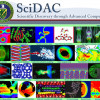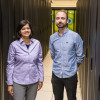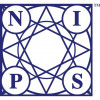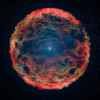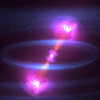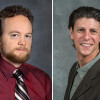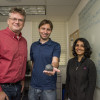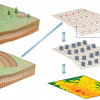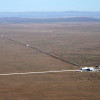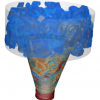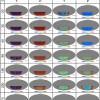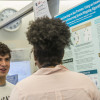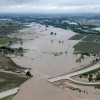News Center
Berkeley Lab Scientists to Lead, Support 12 New SciDAC Projects
When the Department of Energy announced the series of projects under the latest Scientific Discovery through Advanced Computing (SciDAC) program in late 2017, Berkeley Lab scientists, mathematicians and computer scientists were listed as key contributors in two institutes and 10 science application partnerships. Read More »
Berkeley Lab Projects Advance Running, Scheduling of Scientific Workflows on HPC Systems
New software automates time-consuming manual tasks for running scientific workflows, helps users make more efficient use of computing resources. Read More »
Berkeley Lab Staff to Participate in Major Machine Learning Conference
Berkeley Lab’s growing involvement in deep learning research and development will be evident next week when several staff members present papers and posters for the first time at the 2017 Conference on Neural Information Processing Systems. Read More »
CRD Staff Honored with Director's Awards for Service and Outreach
Jon Bashor, Daniela Ushizima and Mariam Kiran were honored at the Berkeley Lab Director’s Awards for Exceptional Achievement ceremony on November 30. Read More »
GraphBLAS: Building Blocks For High Performance Graph Analytics
After nearly five years of collaboration between researchers in academia, industry and national research laboratories—including Berkeley Lab's Aydın Buluç—GraphBLAS, a collection of standardized building blocks for graph algorithms in the language of linear algebra, is publicly available. Read More »
The Mystery of the Star That Wouldn’t Die
Berkeley Lab and UC Berkeley scientists were part of a team that helped to decipher one of the most bizarre spectacles ever seen in the night sky: A supernova that refused to stop shining, remaining bright far longer than an ordinary stellar explosion. What caused the event is puzzling. Read More »
ECP Pagoda Project Rolls Out First Software Libraries
Just one year after the DOE's Exascale Computing Program began funding projects to prepare scientific applications for exascale supercomputers, the Pagoda Project has successfully reached a major milestone: making its open source software libraries publicly available as of September 30, 2017. Read More »
2017 Techwomen Foster Collaborations at Berkeley Lab and Around the Globe
Berkeley Lab's Daniela Ushizima, Romy Chakraborty, and Jackie Scoggins are collaborating with two Techwomen—Patu Ndango from Cameroon and Rim Abid from Tunisia — on quality control methods for constrained environments. Read More »
Scientists Decode the Origin of Universe’s Heavy Elements in the Light from a Neutron Star Merger
Scientists have obtained the first measurement of the merger of two neutron stars and its explosive aftermath. Computer simulations were critical for understanding the event, which could provide valuable insights into the origin of universe’s heavy elements. Read More »
ESnet’s Science DMZ Design Could Help Transfer, Protect Medical Research Data
As medicine becomes more data-intensive, a Medical Science DMZ design proposed by Berkeley Lab's Sean Peisert and Eli Dart could provide a secure solution for medical science data transfers. Read More »
International Team Reconstructs Nanoscale Virus Features from Correlations of Scattered X-rays
As part of an international research team, Jeff Donatelli, Peter Zwart and Kanupriya Pande of the Center for Advanced Mathematics for Energy Research Applications (CAMERA) at Berkeley Lab contributed key algorithms which helped achieve a goal first proposed more than 40 years ago – using angular correlations of X-ray snapshots from non-crystalline molecules to determine the 3D structure of important biological objects. Read More »
Assessing Regional Earthquake Risk and Hazards in the Age of Exascale
Researchers from Berkeley Lab, Lawrence Livermore Lab and UC Davis are building the first-ever end-to-end simulation code to precisely capture the geology and physics of regional earthquakes, and how the shaking impacts buildings. Read More »
How Berkeley Lab Software Led to the 2017 Nobel Prize in Physics
Back in 2004, two years before LIGO began operating at design sensitivity and 13 years before the project received the 2017 Nobel Prize in Physics, programming tools developed at Berkeley Lab were used to set up an efficient system to distribute the data that would put the predictions of Einstein’s General Theory of Relativity to the test. Read More »
Berkeley Lab-led ECP Co-Design Center Achieves Orders of Magnitude Speed-Up in Latest Software Release
Just one year after the U.S. Department of Energy's (DOE) Exascale Computing Program began funding projects to prepare scientific applications for exascale supercomputers, the Block-Structured Adaptive Mesh Refinement Co-Design Center has released a new version of its software that solves a benchmark problem hundreds of times faster than the original baseline. Read More »
Quantum Computation to Tackle Fundamental Science Problems
Two Berkeley Lab teams will receive DOE funding to develop near-term quantum computing platforms and tools to be used for scientific discovery in the chemical sciences. One team will develop novel algorithms, compiling techniques and scheduling tools, while the other team will design prototype four- and eight-qubit processors to compute these new algorithms. Read More »
A TOAST for Next Generation CMB Experiments
Researchers in Berkeley Lab's C3 recently achieved a critical milestone in preparation for upcoming CMB experiments: scaling their data simulation and reduction framework TOAST to run on all 658,784 Intel Knights Landing Xeon Phi processor cores on the NERSC’s Cori. The team also implemented a new TOAST module to simulate the noise introduced when ground-based telescopes look at the CMB through the atmosphere. Read More »
CRD Researchers to Present 18 Posters at ASCR Applied Math PI Meeting
Researchers from Berkeley Lab will present 18 posters at the Sept. 11-12 2017 ASCR Applied Mathematics Principal Investigators Meeting. Read More »
CRD Post-doc Wins IBM Research Prize
Mauro Del Ben, a post-doc in CRD’s Computational Chemistry, Materials and Climate Group has been awarded the IBM Research Forschungspreis for his Ph.D. thesis on “Efficient Non-Local Dynamical Electron Correlation for Condensed Matter Simulations.” Read More »
Students, Faculty Head Back to School, but a Few Staying On at CRD
Their posters rolled up after a lively Aug. 3 presentation session, nearly all of the students and guest faculty working in the Berkeley Lab Computing Sciences area are now back home, starting the new school year. But Rafael Zamora and Tom Corcoran from Hood College had their stays extended as they apply deep learning to classify specific protein structures that could lead to more effective drugs for fighting cancer. Read More »
CRD’s Internship Impact: From Berkeley Lab Cubicles to Television
Last month, CRD’s Daniela Ushizima was an invited guest on the Brazilian television program “Questao de Ordem” where she talked about her work on the analysis of microscopic images. Read More »
Targeting Better Cancer Drugs through Berkeley Lab Partnership
Sally Ellingson and Derek Jones of the University of Kentucky, Lexington, spent the summer working in CRD to use machine learning to enhance a model for predicting how drugs will bind to specific proteins. Read More »
Berkeley’s Lin Lin Receives 2017 DOE Early Career Award
Lin Lin, a faculty scientist in Berkeley Lab’s Computational Research Division and an assistant professor in UC Berkeley’s Mathematics Department, has received a 2017 Early Career Research Program award from the Department of Energy’s Office of Science. Read More »
CRD’s Pazner Wins First-Place in AIAA Aviation Forum’s Student Paper Competition
Will Pazner, a graduate student researcher in CRD’s Mathematics Group won first place in the computational fluid dynamics category of a student paper competition hosted by the 2017 American Institute of Aeronautics and Astronautics (AIAA) Aviation Forum. Read More »
“Hindcasting” Study Investigates the Extreme 2013 Colorado Flood
Using a publicly available Weather Research and Forecasting regional model, Berkeley Lab researchers “hindcast” the conditions that led to the Sept. 9-16, 2013 flooding around Boulder, Colo. and found that climate change attributed to human activity made the storm much more severe than would otherwise have occurred. Read More »
New Data Archive Aims to Amplify Impact of Ecosystem Research
Berkeley Lab’s Computing Sciences and Earth & Environmental Sciences Area are partnering on a three-year project to develop an archive that will serve as a repository for hundreds of DOE-funded research projects under the agency’s Environmental System Science umbrella. Read More »









